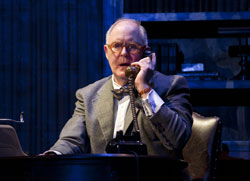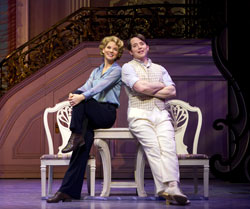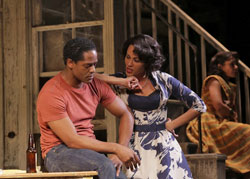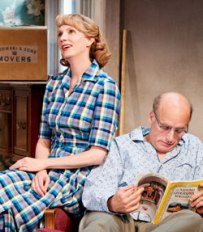Review: The Columnist
Apr 26th

In his first significant effort since his Tony and Pulitzer Prize-winning Proof, playwright David Auburn delivers a biographical drama about a once famous figure little known today: Joseph Alsop, one of the most influential political columnist of his era. And like its subject, a die-hard liberal who was also an anti-Communist and fervent supporter of the Vietnam War, The Columnist is filled with contradictions.
While it’s admirable that Auburn would seek to educate modern audiences about this fascinating figure, the play being presented by the Manhattan Theatre Club never quite conveys its reason for being. It mainly revolves around the most dramatic element of Alsop’s life—his being blackmailed by the Russians with incriminating photos of a gay sexual liaison in Moscow that turned out to be a set-up by the KGB. But instead of capitulating, Alsop informed the U.S. authorities of the situation and managed to go on with his career. Clearly, he benefited from living in a pre-TMZ era.
That episode is highlighted in the play’s arresting opening scene, in which Alsop (John Lithgow) engages in a playful post-coital conversation with his hunky Russian lover, Andrei (Brian J. Smith).
Gradually, further details about the iconoclastic, curmudgeonly journalist’s life and career are depicted: His brother and longtime collaborator Stewart (Boyd Gaines) has turned to writing puff pieces for the Saturday Evening Post while desperately trying to prevent Joe’s secret life from being exposed by such journalists as New York Times reporter David Halberstam (Stephen Kunken): Alsop enters into a marriage of convenience with the long-suffering Susan (Margaret Colin) and does his best to be a loving stepfather to her rebellious teenage daughter (understudy Adria Vitlar, substituting for Grace Gummer), no easy task during the sexually liberated ‘60s.
Spanning roughly ten years in Alsop’s life, the drama lurches uneasily from episode to episode, with Act I feeling frustratingly opaque. Things pick up considerably in the second half, thanks to such superbly written and played scenes as Joseph’s bitter encounter with his brother over both political and personal issues, and a reunion between him and Andrei in which the tables are ironically turned.
Although it ultimately adds up to less than the sum of its parts, The Columnist manages to be both engrossing and informative, a rarity in a time when so many dramas are essentially navel gazing exercises. Sensitively and fluidly staged by Daniel Sullivan, it also benefits from the superb performances.
Although we’ve seen Lithgow do this sort of thing before—he’s played columnists in Sweet Smell of Success and Mr. & Mrs. Fitch, and his diplomat character was similarly duped in M. Butterfly—that doesn’t lessen the impact of his superbly modulated turn here. Gaines does his usual excellent work as the tortured Stewart; Colin is deeply sympathetic as the aggrieved Susan; and Smith makes a vivid impression as the Russian hunk who is more complex than he seems.
Samuel J. Friedman Theatre, 261 W. 47 th St. 212-239-6200. www.Telecharge.com. Through June 17.
Review: Nice Work If You Can Get It
Apr 25th

The dissolute playboy played by Matthew Broderick in Nice Work If You Can Get It is frequently inebriated, and it wouldn’t be a bad idea to be in a similar state to enjoy the slight charms of this “new” Gershwin musical. Like such predecessors as My One and Only and Crazy for You, this show incorporates numbers from the formidable Gershwin songbook into a ramshackle book, in this case written by Joe DiPietro and “inspired by,” or more accurately, cribbed by material by Guy Bolton and P.G. Wodehouse.
The silly, Prohibition-era storyline revolves around the comic mayhem that ensues when Jimmy Winter (Broderick), about to embark on his fourth marriage, meets Billie Bendix (Kelli O’Hara), one of a trio of bootleggers who hatch a plan to hide their hooch in Jimmy’s Long Island mansion. Unbeknownst to them, that’s where the nuptials are going to take place, so they’re forced to don disguises, with Billie’s partner Cookie (Michael McGrath) donning the role of Jimmy’s new butler.
But there’s little point in recounting the plot, since it basically serves as an excuse to trot out nearly two dozen songs by George and Ira, ranging from the oh-so-familiar (“Fascinating Rhythm,” “Lady Be Good,” “But Not for Me,” “I’ve Got a Crush on You”) to such relatively little known gems as “Treat Me Rough” and “Delishious.” For instance, when Jimmy and Billie are forced to pretend to be warring newlyweds—don’t ask—they naturally sing, what else, “Let’s Call the Whole Thing Off.”
At one point in the proceedings Jimmy, when asked if he’s street smart, replies, “No, just rich and good looking. Turns out that’s enough.” That could well sum up the ethos of the show, which relies on charm and good humor to compensate for its lack of substance, even of the comedic variety.
Still, there’s fun to be had. Ironically, it comes less from the star power of Broderick and O’Hara than the supporting players. Michael McGrath and Judy Kaye essentially steal the show with their pitch-perfect comic timing and delivery of even the hoariest lines, with the latter scoring the biggest audience response while singing “Looking for a Boy” while giddily hanging from a chandelier. Chris Sullivan is a hoot as the third bootlegger, a rough and tumble type who pretends to be a British duke in order to woo a gold-digging floozy (an amusing Robyn Hurder). And though she doesn’t make an appearance until the last few minutes, Estelle Parsons delivers an impeccable comic turn as Jimmy’s disapproving mother.
Kathleen Marshall has staged the proceedings in properly fizzy fashion, but her choreography is surprisingly unimaginative, especially considering her outstanding work in last season’s similarly frothy Anything Goes. But the show looks damn good, thanks to Derek McLane’s elaborate sets and especially Martin Pakledinaz’ elegant costumes.
Broderick’s performance, reminiscent of Edward Everett Horton in its befuddled amiability, is amusing but toothless--the actor seems to have totally lost the sharp comic edge he once displayed as Ferris Bueller. He has a pleasant enough voice, but can’t really put the numbers over, and the effort he projects while dancing is wince inducing. Indeed, his finest moment is when he’s being carried about by a line of chorus girls. O’Hara is fetching as ever, and gorgeously sings such songs as “Someone to Watch Over Me,” but she too lacks true comedic spark.
Ultimately, the show’s title proves all too accurate, at least for everyone creatively involved. There’s nothing at all distinguished about it, but thanks to Gershwin’s still effervescent music it still manages to provide diverting entertainment that should well please the matinee ladies.
Imperial Theatre, 249 W. 45th St. 212-239-6200. www.Telecharge.com.
Review: Ghost the Musical
Apr 24th

The current spate of Broadway musicalizations of hit movies hits another nadir with Ghost. This adaptation of the 1990 Patrick Swayze/Demi Moore film is mainly notable for its extravagant production values, which, appropriately enough, contains as many cinematic elements as live ones. Between the endless projections and the impressive recreations of the film’s special effects, the show seems less a Broadway musical than a multi-media amusement park attraction.
The story itself retains its--pardon the pun--haunting appeal, especially to young women for whom a dead lover is the least threatening of all. Bruce Joel Rubin’s adaptation of his Oscar winning screenplay hews closely to the original in its tale of star-crossed young lovers Sam (Richard Fleeshman) and Molly (Caissie Levy), who have an idyllic relationship other than the fact that he has the unfortunate habit of replying “ditto” whenever she says she loves him.
But just as they’ve moved into their funky new Brooklyn apartment they find themselves separated by the Great Divide when Sam is gunned down in an apparent botched robbery. Except that Sam isn’t really gone—he sticks around in spectral form, pining for Molly while also trying to protect her from the nefarious figure, not to revealed here, who engineered his demise.
Helping him is the one person who can hear, if not see him—Oda Mae Brown (Da’Vine Joy Randolph), a colorful con artist psychic who discovers, much to her consternation, that her powers are not entirely faked.
Sam’s being trapped between this world and the next provides the show’s raison d’etre, as his spectral state is vividly conveyed in a series of technical set pieces designed by illusionist Paul Kieve. Most notable is a sequence in a subway car in which Sam does battle with a surly ghost (Tyler McGee) from whom he hopes to learn the secret of moving objects with his thoughts.
Although it’s mostly played as romantic melodrama, would-be comic relief is provided by Randolph’s Oda Mae, costumed in a series of grotesque outfits. Although sh certainly scores laughs as the character for whom Whoopi Goldberg won an Oscar, her wildly over-the-top turn ultimately proves more grating than amusing.
But while the story still works, the bland score by Dave Stewart (The Eurythmics) and pop songwriter Glen Ballard (the composer of hits for Michael Jackson, Alanis Morissette, Aerosmith and countless others) doesn’t. Filled largely with forgettable power-pop ballads, it mainly serves to pad out the show’s running time. Thankfully, there are several, if all too brief, renditions of the classic “Unchained Melody” to alleviate the musical torpor.
Speaking of which, the show forgoes a major opportunity by failing to reprise the movie’s most iconic scene, in which potter Molly sensuously crafts one of her creations while being lovingly caressed by the ghostly Sam as the Righteous Brothers classic soars on the soundtrack.
The two leads--repeating their performances from the original London production--are pretty to look at and sing well enough. But neither brings much more than sex appeal to their roles, although for this show’s target audience that may well be enough.
Matthew Warchus’ staging, which features a large ensemble and numerous large-scale but entirely superfluous production numbers, is the most elaborately tricked-out one on Broadway—other than Spider Man: Turn Off the Dark, of course. Whether that’s enough to propel it to success is another story. But then again, this time last year who would have predicted that the Spidey musical would still be going strong?
Lunt-Fontanne Theatre, 205 W. 46th St. 877-250-2929. www.Ticketmaster.com.
Review: A Streetcar Named Desire
Apr 23rd

The new Broadway revival of Tennessee Williams A Streetcar Named Desire presents a particular dilemma. Its multiracial cast could well attract new audiences for this seminal 20th century drama. But the subpar rendition on display will leave them wondering what all the fuss is about.
There’s nothing egregiously wrong with this production directed by regional theater stalwart Emily Mann. But there’s nothing particularly right about it either. The problem is not in the color-blind casting—the playwright himself approved of the concept many years ago, and it works within the New Orleans setting—but rather that this ensemble, consisting of Blair Underwood (Stanley), Nicole Ari Parker (Blanche), Daphne Rubin-Vega (Stella) and Wood Harris (Mitch), simply isn’t up to snuff.
All of them are accomplished actors, but here they are either miscast or fail to convey the complexities of their characters. Underwood, who frequently bares his toned torso to rapturous response, certainly has the sex appeal for the role. But he’s never fully convincing in his brutishness, nor does he capture the preening humor in Stanley’s macho posturing. Here, for instance, the hilariously pompous references to the “Napoleonic Code” simply fall flat.
The 41-year-old Parker is technically the right age to play Blanche. But there’s absolutely nothing of the Southern belle in her, and certainly no faded beauty. Indeed, the actress is so radiantly stunning that it’s hard to believe she could ever want for male attention, and when Mitch cruelly exposes her Blanche to the garish light of a bare bulb it simply exposes her gorgeousness even more. Worse, the soft-spoken actress is often hard to understand, and when she is discernible it becomes apparent that her line readings lack any sense of poetry.
Rubin-Vega is more effective as Stella, well depicting her earthiness as well as the erotic heat that binds her to her husband despite his hair-trigger temper and physical abuse. On the other hand, the lanky, physically commanding Harris is an ill fit for the overweight Mitch, and never convinces us of the character’s insecurities.
The actors frequently race through their dialogue at breakneck speed, effectively speeding up the evening’s pace but never really mining the material’s bountiful riches.
The production dutifully lays on the New Orleans atmosphere thick and heavy, with French Quarter neon signs flashing in the background and Terence Blanchard’s plaintive jazz score adding to the sultry mood. Eugene Lee’s set design of the Kowalski home is appropriately ramshackle, but perhaps too much so—at the performance attended the front door stuck tight, forcing Underwood to comically crawl into the house through a window.
The all-black revival of Cat on a Hot Tin Roof, presented by the same producer a few seasons ago, was far more effective. But then again, it had the advantage of the galvanizing James Earl Jones as Big Daddy. This Streetcar boasts no such ringers, and ultimately has the feel of a well-intentioned but hopelessly mediocre summer-stock production.
Broadhurst Theatre, 235 W. 44 th St. 212-239-6200. www.Telecharge.com. Through July 22.
Review: Clybourne Park
Apr 20th

Its Pulitzer Prize not withstanding, Clybourne Park still seems to me a better idea for a play than it actually is. Bruce Norris’ dark comedy, which has now arrived on Broadway after heralded engagements at Playwrights Horizons and numerous other venues, certainly earns points for pungently tackling the still white-hot issue of racism. But this riff on Lorraine Hansberry’s A Raisin in the Sun substitutes gimmickry for real drama and ultimately feels more sensationalistic than enlightening.
The premise is certainly imaginative. The first half is set in 1959, when a white Chicago couple is preparing to sell their home to a black family—the Youngers of Hansberry’s drama, although it’s never explicitly spelled out. The sale has their white neighbors, led by a smarmy community spokesman, up in arms.
Act 2 takes place 50 years later, when the dilapidated dwelling in the now gentrifying neighborhood has just been bought by a yuppie couple. The angry interactions among the characters in both acts illustrate the racial divides that are still prevalent, if now somewhat beneath the surface.
The first segment features generous doses of mordant humor, mostly supplied by the angry homeowner (Frank Wood) who bristles at the interference of such characters as an unctuous priest (Brendan Griffin). But melodrama comes to the fore with the revelation that the long-married couple is selling their home because their son, who was accused of committing an atrocity during his service in the Korean War, hanged himself in an upstairs bedroom.
In the play’s second half the humor takes a darker turn, as the characters, including a black couple, begin trading provocative racial jokes and insults that recall the plays of Neil LaBute in their deliberate shock value. The not so subtle message is that even white liberals harbor unconscious, latent prejudices. The two halves of the play are tied together in a coda that is meant to be hauntingly poetic but doesn’t really mean very much.
The playwright has a clear knack for pungent comic dialogue, as previously displayed in such equally edgy works as The Pain and the Itch. But there’s a glib self-satisfaction and neatness to this play that prevents it from being as revelatory as it clearly intends.
The evening glides by entertainingly enough thanks to the sharp-as-nails staging by Pam MacKinnon and the virtuosic performances by the ensemble, all playing double roles. Each performer shines in at least one if not both of them, especially Jeremy Shamos as the yuppie who keeps putting his foot in his mouth; Crystal A. Dickinson as a long-suffering black maid and later as the friend who delivers a joke shocking enough to make David Mamet blush; and especially Wood as the father whose sharp anger masks his underlying sorrow.
Hansberry’s Raisin in the Sun has endured for more than a half-century because it depicted the travails of fully dimensional characters even as delved into the social issues of its time. Clybourne Park, for all its provocations, is unlikely to have an equally long shelf life.
Walter Kerr Theatre, 219 W. 48th St. 212-239-6200. www.telecharge.com.